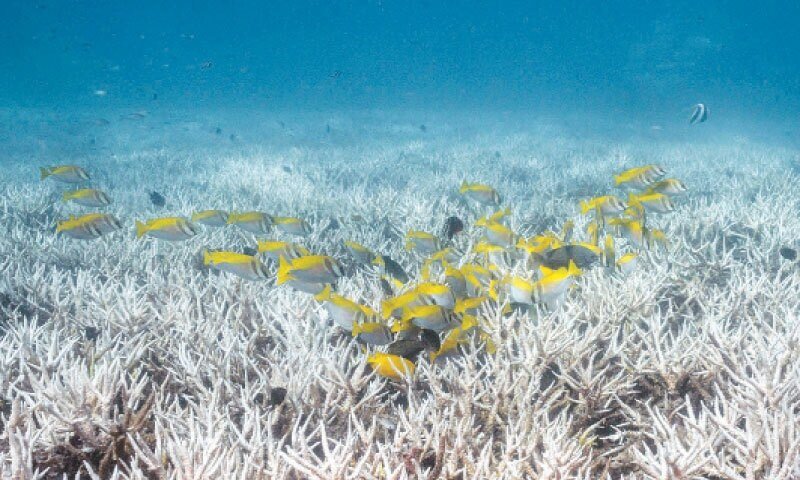PARIS (Reuters) – The world’s tropical coral reefs have almost certainly crossed a point of no return as oceans warm beyond a level that most cannot survive, a major scientific report announced on Monday.
It is the first time scientists have declared that the Earth has likely reached a so-called “tipping point,” a shift that could trigger massive and often permanent changes to the natural world.
“Unfortunately, we are now almost certain that we have crossed one of those tipping points for warm waters or tropical coral reefs,” said report leader Tim Lenton, a climate and Earth system scientist at the University of Exeter.
This conclusion was supported by real-world observations of “unprecedented” coral death on tropical reefs since the first comprehensive scientific assessment of tipping points was published in 2023, the authors said.
In the intervening years, ocean temperatures have soared to historic levels, and the largest and most intense coral bleaching episode ever witnessed has spread to more than 80 percent of the world’s reefs.
Understanding of tipping points has improved since the last report, its authors said, allowing for greater confidence in estimating when a domino effect of catastrophic and often irreversible disasters could be triggered.
Scientists now believe that even with lower levels of global warming than previously thought, the Amazon rainforest could fall into an unrecognizable state and ice sheets from Greenland to West Antarctica could collapse.
‘Unprecedented dieback’
For coral reefs, profound and lasting changes are already underway.
“Already with global warming of 1.4°C, warm-water coral reefs are crossing their thermal tipping point and experiencing unprecedented dieback,” says the report by 160 scientists from dozens of global research institutions.
The global scientific consensus is that most coral reefs would perish with a warming of 1.5°C above pre-industrial levels, a threshold that is only a few years away.
When stressed in warmer ocean waters, corals expel the microscopic algae that provide them with their distinctive color and food source.
Unless ocean temperatures return to more tolerable levels, bleached corals simply cannot recover and eventually starve.
Since 2023, marine scientists have reported coral mortality on a scale never seen before, with reefs turning ghostly white in the Pacific, Indian and Atlantic oceans.
“I’m afraid your response confirms that we can no longer talk about tipping points as a future risk,” Lenton said.
Instead of disappearing completely, scientists say reefs will evolve into less diverse ecosystems as they are overtaken by simpler algae, sponges and other organisms better able to withstand warmer oceans.
These species would come to dominate this new underwater world, and over time, the dead coral skeletons beneath would erode into rubble.
Such a change would be disastrous for the hundreds of millions of people whose livelihoods are tied to coral reefs and for the estimated one million species that depend on them.
‘Danger zone’
Some heat-resistant strains of coral may last longer than others, the authors said, but ultimately the only answer is to stop adding more planet-warming greenhouse gases to the atmosphere.
Exceeding 1.5°C “puts the world in a higher danger zone of increasing risk of even more damaging tipping points,” Lenton said, including the collapse of vital ocean currents that could have “catastrophic” collateral impacts.
Scientists also warned that tipping points in the Amazon were closer than previously thought, and that “widespread dieback” and large-scale forest degradation posed a risk even below 2°C of global warming.
That finding will be deeply felt by Brazil, which on Monday will host climate ministers in Brasilia ahead of next month’s UN COP30 conference in Belem, on the edge of the Amazon.
One piece of good news is that the exponential adoption of solar energy and electric vehicles were two examples of “positive” inflection points where momentum can accelerate for the better, Lenton said.
“It gives agency back to us, including policymakers, to make a tangible difference, where sometimes the outcome of our actions is disproportionately good,” he said.
Published in Dawn, October 14, 2025









